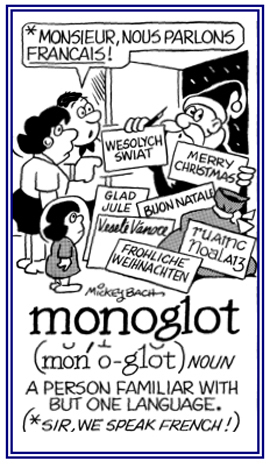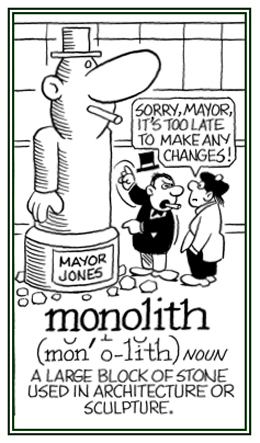mono-, mon-
(Greek: one, alone, single; a number used as a prefix)
monogeny
1. Someone who is able to speak or use only one method of communication in speech: Although Betty was a monoglot, she was able to understand the waiter in the German restaurant by his gestures and by the tone of his voice.
2. Something which is composed in just one language: The local newspaper was only written in English, so it was referred to as being a monoglot.

© ALL rights are reserved.
Go to this Word A Day Revisited Index
2. Something which is composed in just one language: The local newspaper was only written in English, so it was referred to as being a monoglot.

Go to this Word A Day Revisited Index
so you can see more of Mickey Bach's cartoons.
monoglottic
A reference to someone who is capable of speaking only a single language.
monoglyceride, monoglycerides
A compound consisting of one molecule of fatty acid esterified to glycerol when a chemical reaction in which two reactants (typically an alcohol and an acid) form an ester, an organic compound, as the reaction product.
monogomy
monogram
Two or more letters, as initials, formed into a design to be placed on clothing, notepaper, etc., or as a crest.
monogrammatic
A reference to a design composed of one or more letters, typically the initials of a name, used as an identifying mark.
monograph
1. A scholarly article, paper, or book on a single topic or a single set
of things or subjects.
2. A highly detailed and thoroughly documented study, or paper, written about a limited area of a subject or field of inquiry: "She wrote scholarly monographs about the etymology of English words."
3. An account of a single thing, or class of things; such as, of a species of organism.
2. A highly detailed and thoroughly documented study, or paper, written about a limited area of a subject or field of inquiry: "She wrote scholarly monographs about the etymology of English words."
3. An account of a single thing, or class of things; such as, of a species of organism.
monographic
1. A reference to a written work that deals with a subject systematically,
and usually extensively, on some special subject in other areas of
knowledge.
2. A scholarly book or a written presentation on a single subject or a group of related subjects, usually written by one person.
2. A scholarly book or a written presentation on a single subject or a group of related subjects, usually written by one person.
monogynous
1. Having only one wife at a time.
2. In botany, having only one pistil, style, or stigma; belonging to the order Monogynia.
3. Pertaining to asexual reproduction or asexually reproducing organisms.
4. The condition of having a single fertile female as in the colony of many social insects or, in higher forms, having only one female sexual partner.
2. In botany, having only one pistil, style, or stigma; belonging to the order Monogynia.
3. Pertaining to asexual reproduction or asexually reproducing organisms.
4. The condition of having a single fertile female as in the colony of many social insects or, in higher forms, having only one female sexual partner.
monogyny
1. The mating of a male with only one female.
2. The presence of a single queen in a colony of social insects.
3. Producing only male or only female offspring.
2. The presence of a single queen in a colony of social insects.
3. Producing only male or only female offspring.
monolatry
The worship of one god, where other gods may supposedly exist.
monolingual, monolingualism
1. Able to speak only one language.
2. Written, spoken, or produced in only one language.
2. Written, spoken, or produced in only one language.
1. A tall block of solid stone standing by itself: The 887 monoliths, or monumental statues termed "moai" on Easter Island, were made of natural rock by the early Rapa Nui people.
2. A large uniform block of a single building material; such as, concrete pieced together with others to form a building or other stone-like structure: The huge bank, which was multinational, seemed to be like a monolith in the center of the town which consisted of older and smaller shops.
3. Symbolically, something massive and unchanging; especially, a large and long-established organization that is slow to change, uniform in character, and difficult to deal with on a human level: If the two corporations decide to merge, it would create a monolith in the food sector forcing the little markets to close down.

© ALL rights are reserved.
Go to this Word A Day Revisited Index
2. A large uniform block of a single building material; such as, concrete pieced together with others to form a building or other stone-like structure: The huge bank, which was multinational, seemed to be like a monolith in the center of the town which consisted of older and smaller shops.
3. Symbolically, something massive and unchanging; especially, a large and long-established organization that is slow to change, uniform in character, and difficult to deal with on a human level: If the two corporations decide to merge, it would create a monolith in the food sector forcing the little markets to close down.

Go to this Word A Day Revisited Index
so you can see more of Mickey Bach's cartoons.
monolithic
1. Consisting of or formed into a tall block of solid stone.
2. Constructed using massive stones or large seamless blocks of material.
3. A reference to something which is massive, uniform in character, and slow to change.
2. Constructed using massive stones or large seamless blocks of material.
3. A reference to something which is massive, uniform in character, and slow to change.


